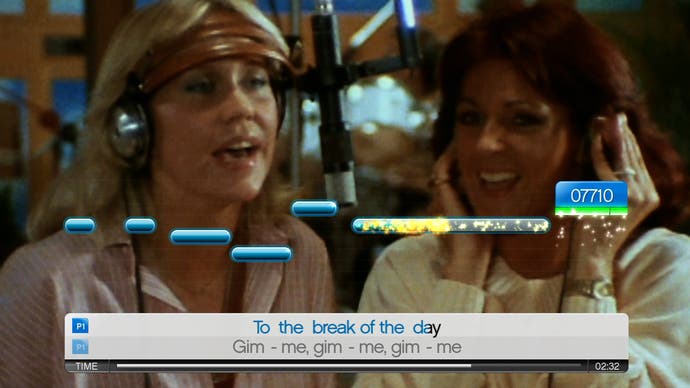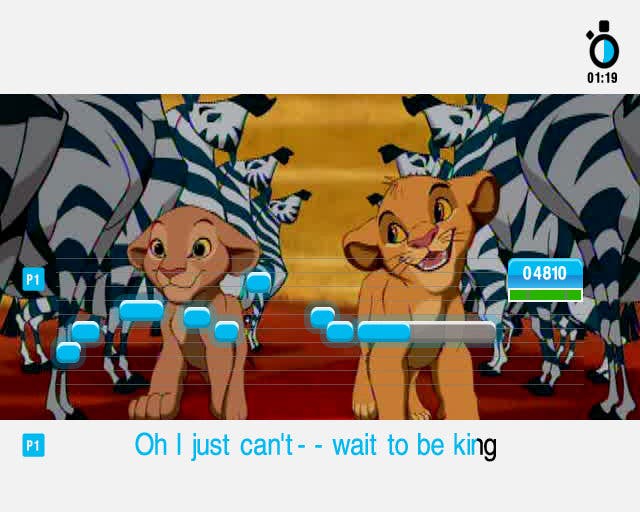SingStar: Past, Present and Future
Sony's karaoke revolution.
Given the game's broad appeal though (my mum has played SingStar, and she can't even make a new folder in Windows XP), it's no surprise to hear Ranyard talking about the inclusiveness of new features. "From some of our really rough stats, about 80 per cent of people playing SingStar are in a social experience. They've got friends round, or family, or whatever," he says. "But that means there are 20 per cent who perhaps aren't, at that time. And actually, 20 per cent of SingStar users is quite a lot of people, so catering to that experience is a totally reasonable thing that we'd consider."
As he says this, I'm reminded of my personal remorse at the deletion of friend-of-Eurogamer Keza MacDonald's X-rated version of "Suddenly I See", and the loss of my own emotional rendition of "Torn" by Natalie Imbruglia. Ranyard points out that there's a ratings element to that - the games have a relatively low 12+ PEGI designation to hit, and sometimes go to 3+ - so I ask whether it's worth putting out a one-off "grown-ups" SingStar to give us all an avenue into slightly less family-friendly songs. And behaviour. "As the community grows, there may be a time when we have sub-communities," he speculates. "At the other end of the spectrum, maybe there's a sub-community for younger players."
And despite a few teething problems with the Store when it launched (many speculate it was the reason the game, originally a PS3 launch title, took so long to arrive), London Studio now embraces PlayStation Network as much as the next developer, even if the next developer is Media Molecule. "The concept of being online [or not] is almost irrelevant," Ranyard points out, citing the growth of sites like Facebook alongside games like LittleBigPlanet. "Things like that are informing us about where we're going." Global online leaderboards seems like an obvious step.

There are also now over 650 songs on SingStore, but despite the huge number, and Ranyard's eagerness to talk about scaling up or down for people of different age groups and singing ability, there have been accusations of a narrow focus. When a list of the top ten best-selling songs was published recently, the first comment on the Guardian's write-up said: "all that's on the SingStore is eighties pop, obscure Euro hits you've never heard of, and mind-numbingly dull commercial indie". Does the SingStore have a problem with variety?
"Personally, I don't think there's a problem with variety," Ranyard says. "Eighties pop? You know, the biggest-downloaded song is Bonnie Tyler's 'Total Eclipse of the Heart'... I've been in bands and all sorts back in my younger days, and I think one thing that SingStar does really well is highlight great songs... I didn't like [Total Eclipse of the Heart] when it came out, because I was a punk, but I love doing it now because it's a great song."
So how are songs chosen, then, and how do they end up on SingStore? "We have evaluation criteria, so if a song's got a two-minute instrumental in the middle, it's perhaps not a great SingStar song. It's really simple things like that... But having said that, sometimes the artist and the song are so loved by the fanbase that you might be forgiving of one or two of those things because it's an absolute classic." As for who actually picks the songs, there are offices in places like Spain, Portugal and Germany who submit wishlists. "We don't necessarily have one place that picks all the songs," says Ranyard. "We tend to use marketing departments, for example, because they obviously know what their territory wants, what consumers want."

Once a song's decided, it needs to be licensed, and that's a complicated process that takes up to 12 weeks for the team of five people whose job it is to sort it all out. "Lots of rights are owned by different people and you can only use something when you've cleared all those rights," says Ranyard. "For example, if a song's written by three or four people, each person could be represented by a different company."
Getting it into the game happens at London Studio. "We've got a team of musicians who sit and listen to the songs and work out the melody that you're going to sing, and work it so the lyrics appear at the right time, which is a gameplay thing but we hire musicians to do that - so each one is crafted by human hands and ears, if you like."
